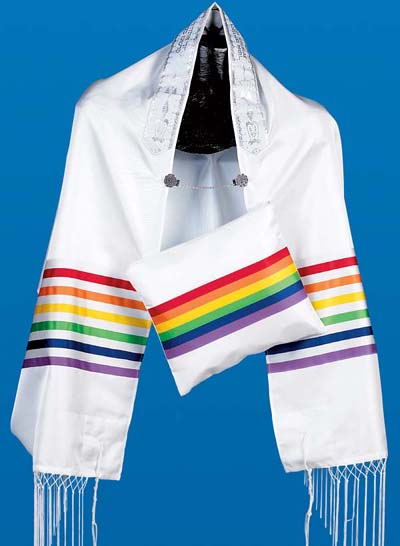
When I first heard about the National LGBTQ Task Force’s decision to cancel A Wider Bridge’s event at the Creating Change conference this past weekend, I was sad. I know what it’s like as a religious person to feel alienated from queer spaces because of my decision to remain religious despite coming out of the closet, and A Wider Bridge, for better or for worse, was a much-needed space for Jewish attendees of the conference to gather together.
When the decision was reversed just thirty-six hours later, I was still upset. I wasn’t upset because the entire fiasco had taken place in the first place — instead, what disturbed me was the fact that it seems we queer Jews had missed an important opportunity to really think critically about the way that our narrative is presented to other, non-Jewish LGBTQ communities.
And this goes beyond just the not-so-simple issue of pinkwashing — which does happen in our community, and is perpetuated by advocacy organizations in the United States seeking to use the fact that Israel does not criminalize or murder its LGBTQ citizens like the rest of its neighbors as the prime example of Israel’s success as a liberal democracy. This goes beyond the question of whether the reception this past weekend should have been canceled or been reinstated.
Instead of talking about LGBTQ life and culture across an ocean, we, as LGBTQ Jews, need to ask ourselves: Is the image of LGBTQ life in Israel, complicated as it is, actually the conversation that we need to be having as a community?
More broadly, perhaps the question we should be asking is: To what extent should we engage more critically with the challenges that we as LGBTQ religious people still face in our faith communities? In what ways has LGBTQ liberation ignored people of faith, given the understandably poor relationship between many LGBTQ and faith-based organizations? To be sure, there are many great organizations which are doing work to counter the disparities in religious contexts specifically — but what can, and should, be done to reduce some of the stigma that religious LGBTQ people face in starkly secular queer spaces?
The questions and intricacies of LGBTQ life in Israel — and the way that rights there are used to mask other societal problems in the country today — is an important discussion that’s been lost in the outcry over the uninviting and reinviting of A Wider Bridge, the protest of its events, and organizations like StandWithUs using the opportunity to intentionally present misleading information (the Shabbat prayer service was not interrupted) about the protests. The real issue goes beyond the question of the appropriateness of the way the event was handled. Instead, we should be asking much broader, and more crucial, questions of queer American Jews.
If we’re supposed to be creating change, the change with which we must begin isn’t across the Atlantic. It’s here, at home, in our own faith communities and in our own country. The question of pinkwashing, prompted once again by the events of this past weekend, and the leveraging of our narratives to mask some very important issues in Israel is a conversation that we should be having amongst ourselves. Moreover, the wide-ranging topics of the conversation is one best fit not for the wider stage, but for within the Jewish community, to understand how we, as we Jews, can actively work to change the stigma and discrimination that are still pervasive in many Jewish communities.
At the end of the day, what upsets me the most in the aftermath of this dramatic saga of uninviting and re-inviting is the fact that we still need to check ourselves and work on our own communities and the way we are seen and represented in our wider cultures, either as LGBTQ in religious communities or as religious people in LGBTQ communities.
What matters most is not LGBTQ life in Israel, and whether or not that obscures the realities of the occupation, not to mention the vast array of societal problems in Israel today. What matters most are our own lived experiences and how we can best begin to repair some of the gaps that persist between the LGBTQ world and the religious world. This, ultimately, is where we need “a wider bridge:” not between the United States and Israel, but between the necessities that are served by queer community and the obligation that comes with religious community.
The staunchly secular, even anti-religious LGBTQ world often stigmatizes those of us who come out and decide to remain religious — indeed, there have been times on campus where I’ve felt less at home in queer spaces than in religious, non-queer spaces because of my decision to remain religious. I have, on multiple occasions, felt out of place in queer spaces because I visibly mark myself as Jewish. That is where queer Jewish organizations need to be placing their focuses when we engage with the wider queer activist community.
What we need more of right now is not the bridging of gaps of the Atlantic Ocean between the societal problems in the United States and those in Israel, but bridging the gaps caused by the cognitive dissonance of being an LGBTQ person of faith and how those two identities — both equally important, and both equally uncompromising — intersect.
I don’t want to talk about Israel. I want — and need — to talk about here and now, and the realities that come with being an LGBTQ person of faith in communities where both parts of my identity are pathologized and stigmatized. Compared to the many problems that queer people of faith still face in staunchly irreligious spaces in the US, talking about Israel is an important luxury that we can’t afford.
Amram Altzman is a student at List College.
